Exploring CIF Contracts and Letters of Credit in Commercial Law
VerifiedAdded on 2023/06/14
|9
|3034
|251
Report
AI Summary
This report provides a detailed analysis of commercial law, focusing on Cost, Insurance, and Freight (CIF) contracts and letters of credit. It covers the key features of CIF contracts, including the rights and obligations of buyers and sellers, and discusses various types of letters of credit such as documentary, standby, revocable, irrevocable, confirmed, unconfirmed, resolving, transferable, and back-to-back letters. The report also elucidates the principle of autonomy and strict compliance in letters of credit, supported by relevant case laws like Hamzeh Malas & sons vs British Imex Industries Ltd and Discount Records Ltd vs Barclays Bank Ltd. Furthermore, it explains the standards for the examination of documents under UCP 600, highlighting Articles 14 and 18, which outline the responsibilities of banks in adhering to international standards. The report references relevant provisions of UCP 600 and advises on the legal positions of banks in these transactions.

Commercial Law
Paraphrase This Document
Need a fresh take? Get an instant paraphrase of this document with our AI Paraphraser
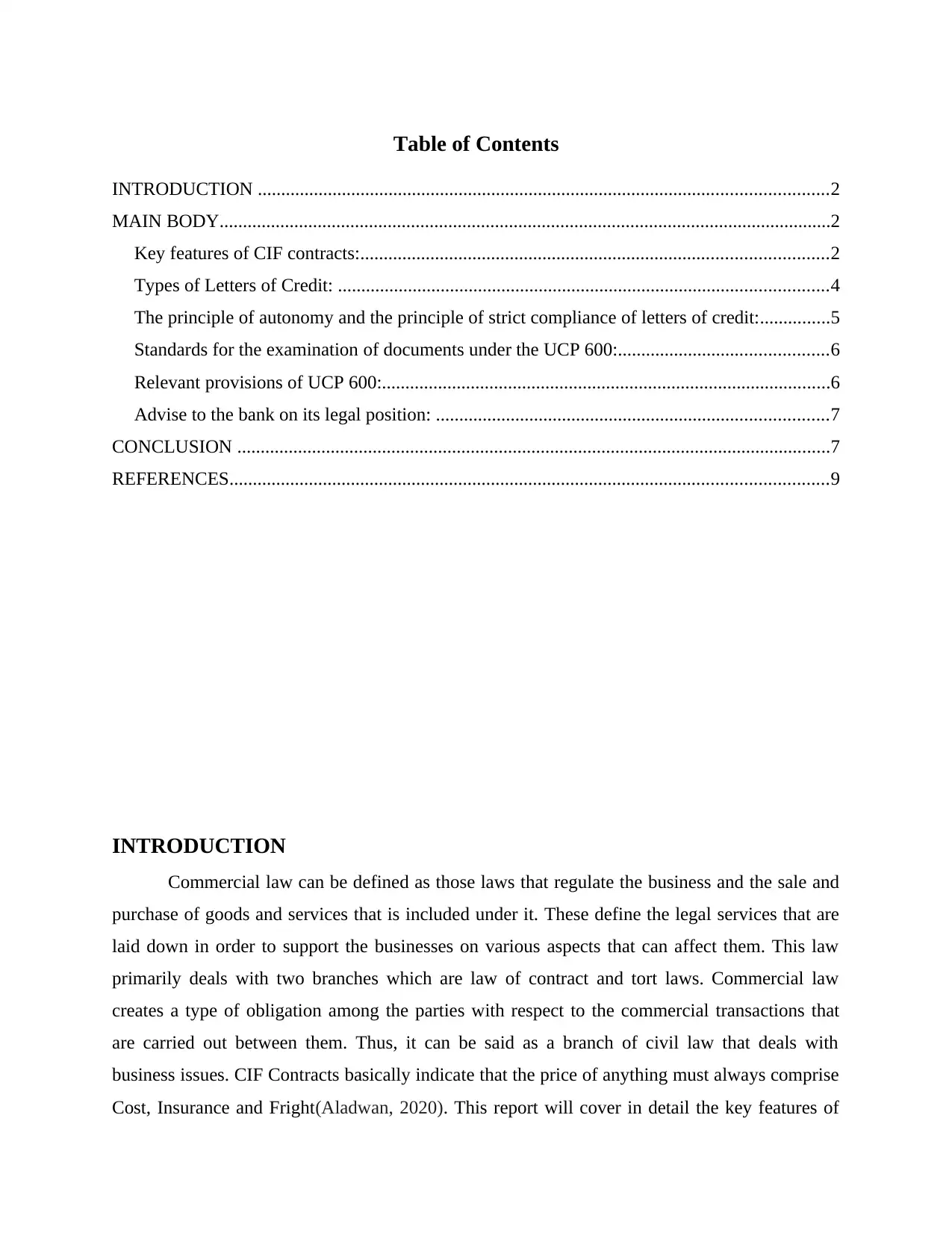
Table of Contents
INTRODUCTION ..........................................................................................................................2
MAIN BODY...................................................................................................................................2
Key features of CIF contracts:....................................................................................................2
Types of Letters of Credit: .........................................................................................................4
The principle of autonomy and the principle of strict compliance of letters of credit:...............5
Standards for the examination of documents under the UCP 600:.............................................6
Relevant provisions of UCP 600:................................................................................................6
Advise to the bank on its legal position: ....................................................................................7
CONCLUSION ...............................................................................................................................7
REFERENCES................................................................................................................................9
INTRODUCTION
Commercial law can be defined as those laws that regulate the business and the sale and
purchase of goods and services that is included under it. These define the legal services that are
laid down in order to support the businesses on various aspects that can affect them. This law
primarily deals with two branches which are law of contract and tort laws. Commercial law
creates a type of obligation among the parties with respect to the commercial transactions that
are carried out between them. Thus, it can be said as a branch of civil law that deals with
business issues. CIF Contracts basically indicate that the price of anything must always comprise
Cost, Insurance and Fright(Aladwan, 2020). This report will cover in detail the key features of
INTRODUCTION ..........................................................................................................................2
MAIN BODY...................................................................................................................................2
Key features of CIF contracts:....................................................................................................2
Types of Letters of Credit: .........................................................................................................4
The principle of autonomy and the principle of strict compliance of letters of credit:...............5
Standards for the examination of documents under the UCP 600:.............................................6
Relevant provisions of UCP 600:................................................................................................6
Advise to the bank on its legal position: ....................................................................................7
CONCLUSION ...............................................................................................................................7
REFERENCES................................................................................................................................9
INTRODUCTION
Commercial law can be defined as those laws that regulate the business and the sale and
purchase of goods and services that is included under it. These define the legal services that are
laid down in order to support the businesses on various aspects that can affect them. This law
primarily deals with two branches which are law of contract and tort laws. Commercial law
creates a type of obligation among the parties with respect to the commercial transactions that
are carried out between them. Thus, it can be said as a branch of civil law that deals with
business issues. CIF Contracts basically indicate that the price of anything must always comprise
Cost, Insurance and Fright(Aladwan, 2020). This report will cover in detail the key features of
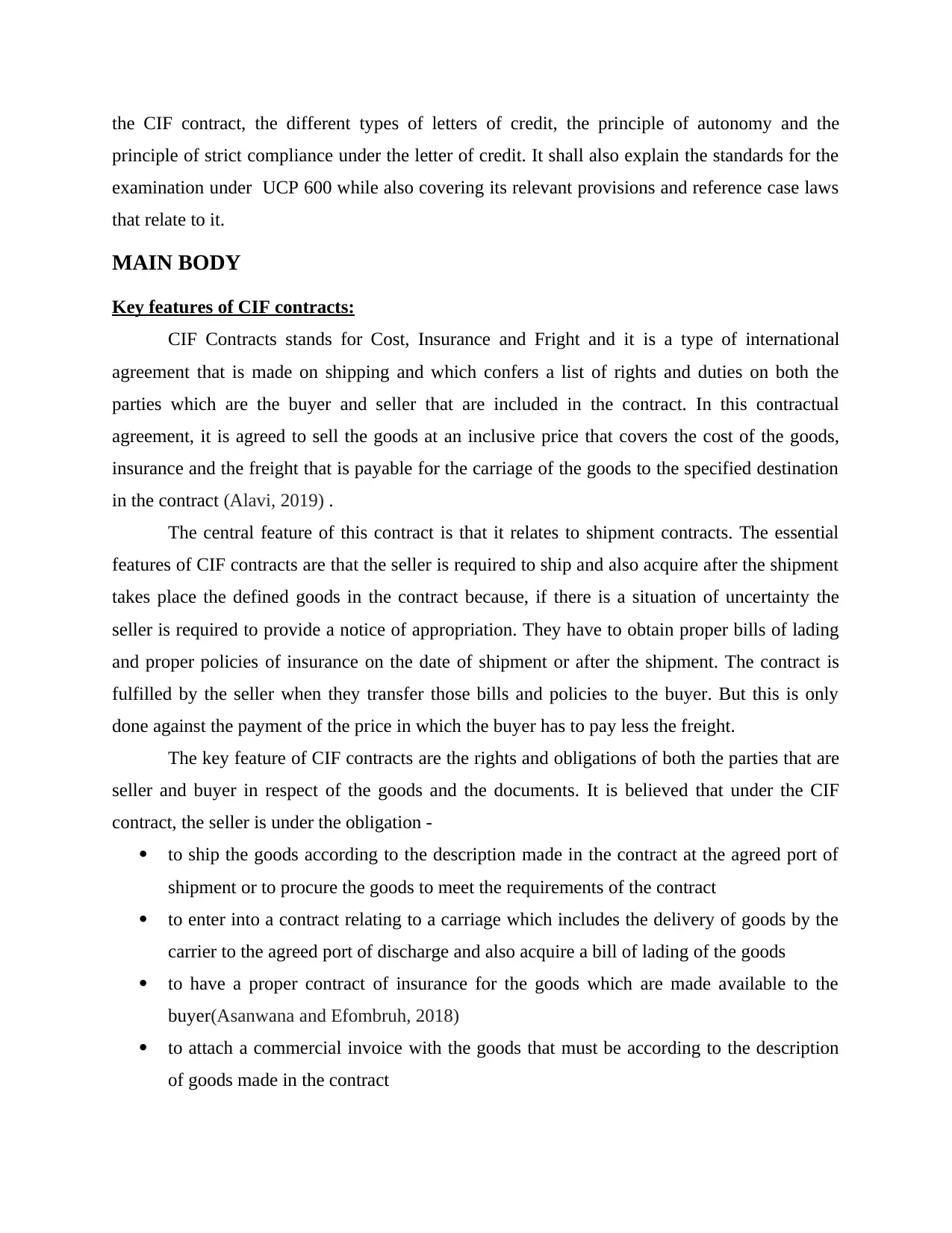
the CIF contract, the different types of letters of credit, the principle of autonomy and the
principle of strict compliance under the letter of credit. It shall also explain the standards for the
examination under UCP 600 while also covering its relevant provisions and reference case laws
that relate to it.
MAIN BODY
Key features of CIF contracts:
CIF Contracts stands for Cost, Insurance and Fright and it is a type of international
agreement that is made on shipping and which confers a list of rights and duties on both the
parties which are the buyer and seller that are included in the contract. In this contractual
agreement, it is agreed to sell the goods at an inclusive price that covers the cost of the goods,
insurance and the freight that is payable for the carriage of the goods to the specified destination
in the contract (Alavi, 2019) .
The central feature of this contract is that it relates to shipment contracts. The essential
features of CIF contracts are that the seller is required to ship and also acquire after the shipment
takes place the defined goods in the contract because, if there is a situation of uncertainty the
seller is required to provide a notice of appropriation. They have to obtain proper bills of lading
and proper policies of insurance on the date of shipment or after the shipment. The contract is
fulfilled by the seller when they transfer those bills and policies to the buyer. But this is only
done against the payment of the price in which the buyer has to pay less the freight.
The key feature of CIF contracts are the rights and obligations of both the parties that are
seller and buyer in respect of the goods and the documents. It is believed that under the CIF
contract, the seller is under the obligation -
to ship the goods according to the description made in the contract at the agreed port of
shipment or to procure the goods to meet the requirements of the contract
to enter into a contract relating to a carriage which includes the delivery of goods by the
carrier to the agreed port of discharge and also acquire a bill of lading of the goods
to have a proper contract of insurance for the goods which are made available to the
buyer(Asanwana and Efombruh, 2018)
to attach a commercial invoice with the goods that must be according to the description
of goods made in the contract
principle of strict compliance under the letter of credit. It shall also explain the standards for the
examination under UCP 600 while also covering its relevant provisions and reference case laws
that relate to it.
MAIN BODY
Key features of CIF contracts:
CIF Contracts stands for Cost, Insurance and Fright and it is a type of international
agreement that is made on shipping and which confers a list of rights and duties on both the
parties which are the buyer and seller that are included in the contract. In this contractual
agreement, it is agreed to sell the goods at an inclusive price that covers the cost of the goods,
insurance and the freight that is payable for the carriage of the goods to the specified destination
in the contract (Alavi, 2019) .
The central feature of this contract is that it relates to shipment contracts. The essential
features of CIF contracts are that the seller is required to ship and also acquire after the shipment
takes place the defined goods in the contract because, if there is a situation of uncertainty the
seller is required to provide a notice of appropriation. They have to obtain proper bills of lading
and proper policies of insurance on the date of shipment or after the shipment. The contract is
fulfilled by the seller when they transfer those bills and policies to the buyer. But this is only
done against the payment of the price in which the buyer has to pay less the freight.
The key feature of CIF contracts are the rights and obligations of both the parties that are
seller and buyer in respect of the goods and the documents. It is believed that under the CIF
contract, the seller is under the obligation -
to ship the goods according to the description made in the contract at the agreed port of
shipment or to procure the goods to meet the requirements of the contract
to enter into a contract relating to a carriage which includes the delivery of goods by the
carrier to the agreed port of discharge and also acquire a bill of lading of the goods
to have a proper contract of insurance for the goods which are made available to the
buyer(Asanwana and Efombruh, 2018)
to attach a commercial invoice with the goods that must be according to the description
of goods made in the contract
⊘ This is a preview!⊘
Do you want full access?
Subscribe today to unlock all pages.

Trusted by 1+ million students worldwide
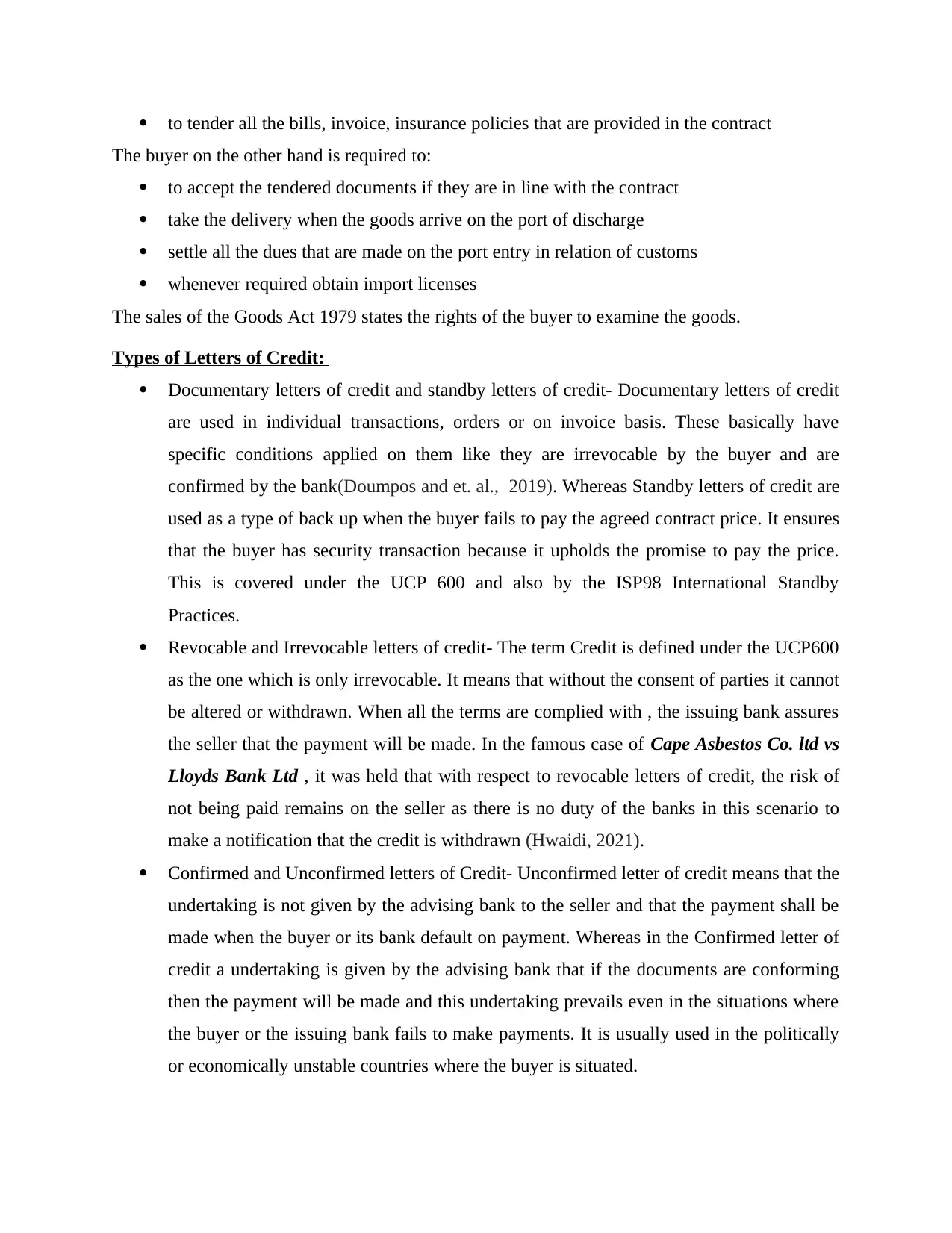
to tender all the bills, invoice, insurance policies that are provided in the contract
The buyer on the other hand is required to:
to accept the tendered documents if they are in line with the contract
take the delivery when the goods arrive on the port of discharge
settle all the dues that are made on the port entry in relation of customs
whenever required obtain import licenses
The sales of the Goods Act 1979 states the rights of the buyer to examine the goods.
Types of Letters of Credit:
Documentary letters of credit and standby letters of credit- Documentary letters of credit
are used in individual transactions, orders or on invoice basis. These basically have
specific conditions applied on them like they are irrevocable by the buyer and are
confirmed by the bank(Doumpos and et. al., 2019). Whereas Standby letters of credit are
used as a type of back up when the buyer fails to pay the agreed contract price. It ensures
that the buyer has security transaction because it upholds the promise to pay the price.
This is covered under the UCP 600 and also by the ISP98 International Standby
Practices.
Revocable and Irrevocable letters of credit- The term Credit is defined under the UCP600
as the one which is only irrevocable. It means that without the consent of parties it cannot
be altered or withdrawn. When all the terms are complied with , the issuing bank assures
the seller that the payment will be made. In the famous case of Cape Asbestos Co. ltd vs
Lloyds Bank Ltd , it was held that with respect to revocable letters of credit, the risk of
not being paid remains on the seller as there is no duty of the banks in this scenario to
make a notification that the credit is withdrawn (Hwaidi, 2021).
Confirmed and Unconfirmed letters of Credit- Unconfirmed letter of credit means that the
undertaking is not given by the advising bank to the seller and that the payment shall be
made when the buyer or its bank default on payment. Whereas in the Confirmed letter of
credit a undertaking is given by the advising bank that if the documents are conforming
then the payment will be made and this undertaking prevails even in the situations where
the buyer or the issuing bank fails to make payments. It is usually used in the politically
or economically unstable countries where the buyer is situated.
The buyer on the other hand is required to:
to accept the tendered documents if they are in line with the contract
take the delivery when the goods arrive on the port of discharge
settle all the dues that are made on the port entry in relation of customs
whenever required obtain import licenses
The sales of the Goods Act 1979 states the rights of the buyer to examine the goods.
Types of Letters of Credit:
Documentary letters of credit and standby letters of credit- Documentary letters of credit
are used in individual transactions, orders or on invoice basis. These basically have
specific conditions applied on them like they are irrevocable by the buyer and are
confirmed by the bank(Doumpos and et. al., 2019). Whereas Standby letters of credit are
used as a type of back up when the buyer fails to pay the agreed contract price. It ensures
that the buyer has security transaction because it upholds the promise to pay the price.
This is covered under the UCP 600 and also by the ISP98 International Standby
Practices.
Revocable and Irrevocable letters of credit- The term Credit is defined under the UCP600
as the one which is only irrevocable. It means that without the consent of parties it cannot
be altered or withdrawn. When all the terms are complied with , the issuing bank assures
the seller that the payment will be made. In the famous case of Cape Asbestos Co. ltd vs
Lloyds Bank Ltd , it was held that with respect to revocable letters of credit, the risk of
not being paid remains on the seller as there is no duty of the banks in this scenario to
make a notification that the credit is withdrawn (Hwaidi, 2021).
Confirmed and Unconfirmed letters of Credit- Unconfirmed letter of credit means that the
undertaking is not given by the advising bank to the seller and that the payment shall be
made when the buyer or its bank default on payment. Whereas in the Confirmed letter of
credit a undertaking is given by the advising bank that if the documents are conforming
then the payment will be made and this undertaking prevails even in the situations where
the buyer or the issuing bank fails to make payments. It is usually used in the politically
or economically unstable countries where the buyer is situated.
Paraphrase This Document
Need a fresh take? Get an instant paraphrase of this document with our AI Paraphraser
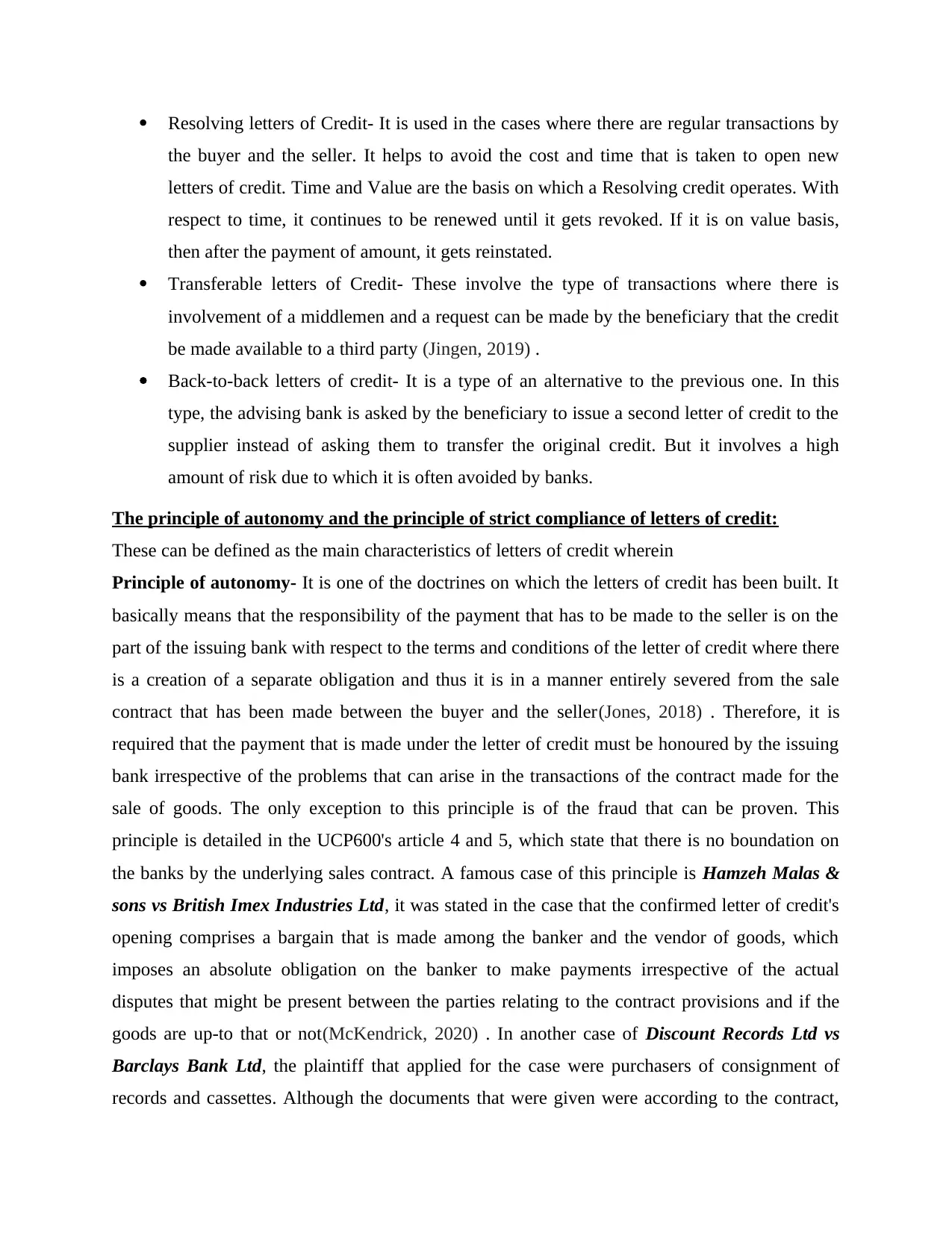
Resolving letters of Credit- It is used in the cases where there are regular transactions by
the buyer and the seller. It helps to avoid the cost and time that is taken to open new
letters of credit. Time and Value are the basis on which a Resolving credit operates. With
respect to time, it continues to be renewed until it gets revoked. If it is on value basis,
then after the payment of amount, it gets reinstated.
Transferable letters of Credit- These involve the type of transactions where there is
involvement of a middlemen and a request can be made by the beneficiary that the credit
be made available to a third party (Jingen, 2019) .
Back-to-back letters of credit- It is a type of an alternative to the previous one. In this
type, the advising bank is asked by the beneficiary to issue a second letter of credit to the
supplier instead of asking them to transfer the original credit. But it involves a high
amount of risk due to which it is often avoided by banks.
The principle of autonomy and the principle of strict compliance of letters of credit:
These can be defined as the main characteristics of letters of credit wherein
Principle of autonomy- It is one of the doctrines on which the letters of credit has been built. It
basically means that the responsibility of the payment that has to be made to the seller is on the
part of the issuing bank with respect to the terms and conditions of the letter of credit where there
is a creation of a separate obligation and thus it is in a manner entirely severed from the sale
contract that has been made between the buyer and the seller(Jones, 2018) . Therefore, it is
required that the payment that is made under the letter of credit must be honoured by the issuing
bank irrespective of the problems that can arise in the transactions of the contract made for the
sale of goods. The only exception to this principle is of the fraud that can be proven. This
principle is detailed in the UCP600's article 4 and 5, which state that there is no boundation on
the banks by the underlying sales contract. A famous case of this principle is Hamzeh Malas &
sons vs British Imex Industries Ltd, it was stated in the case that the confirmed letter of credit's
opening comprises a bargain that is made among the banker and the vendor of goods, which
imposes an absolute obligation on the banker to make payments irrespective of the actual
disputes that might be present between the parties relating to the contract provisions and if the
goods are up-to that or not(McKendrick, 2020) . In another case of Discount Records Ltd vs
Barclays Bank Ltd, the plaintiff that applied for the case were purchasers of consignment of
records and cassettes. Although the documents that were given were according to the contract,
the buyer and the seller. It helps to avoid the cost and time that is taken to open new
letters of credit. Time and Value are the basis on which a Resolving credit operates. With
respect to time, it continues to be renewed until it gets revoked. If it is on value basis,
then after the payment of amount, it gets reinstated.
Transferable letters of Credit- These involve the type of transactions where there is
involvement of a middlemen and a request can be made by the beneficiary that the credit
be made available to a third party (Jingen, 2019) .
Back-to-back letters of credit- It is a type of an alternative to the previous one. In this
type, the advising bank is asked by the beneficiary to issue a second letter of credit to the
supplier instead of asking them to transfer the original credit. But it involves a high
amount of risk due to which it is often avoided by banks.
The principle of autonomy and the principle of strict compliance of letters of credit:
These can be defined as the main characteristics of letters of credit wherein
Principle of autonomy- It is one of the doctrines on which the letters of credit has been built. It
basically means that the responsibility of the payment that has to be made to the seller is on the
part of the issuing bank with respect to the terms and conditions of the letter of credit where there
is a creation of a separate obligation and thus it is in a manner entirely severed from the sale
contract that has been made between the buyer and the seller(Jones, 2018) . Therefore, it is
required that the payment that is made under the letter of credit must be honoured by the issuing
bank irrespective of the problems that can arise in the transactions of the contract made for the
sale of goods. The only exception to this principle is of the fraud that can be proven. This
principle is detailed in the UCP600's article 4 and 5, which state that there is no boundation on
the banks by the underlying sales contract. A famous case of this principle is Hamzeh Malas &
sons vs British Imex Industries Ltd, it was stated in the case that the confirmed letter of credit's
opening comprises a bargain that is made among the banker and the vendor of goods, which
imposes an absolute obligation on the banker to make payments irrespective of the actual
disputes that might be present between the parties relating to the contract provisions and if the
goods are up-to that or not(McKendrick, 2020) . In another case of Discount Records Ltd vs
Barclays Bank Ltd, the plaintiff that applied for the case were purchasers of consignment of
records and cassettes. Although the documents that were given were according to the contract,
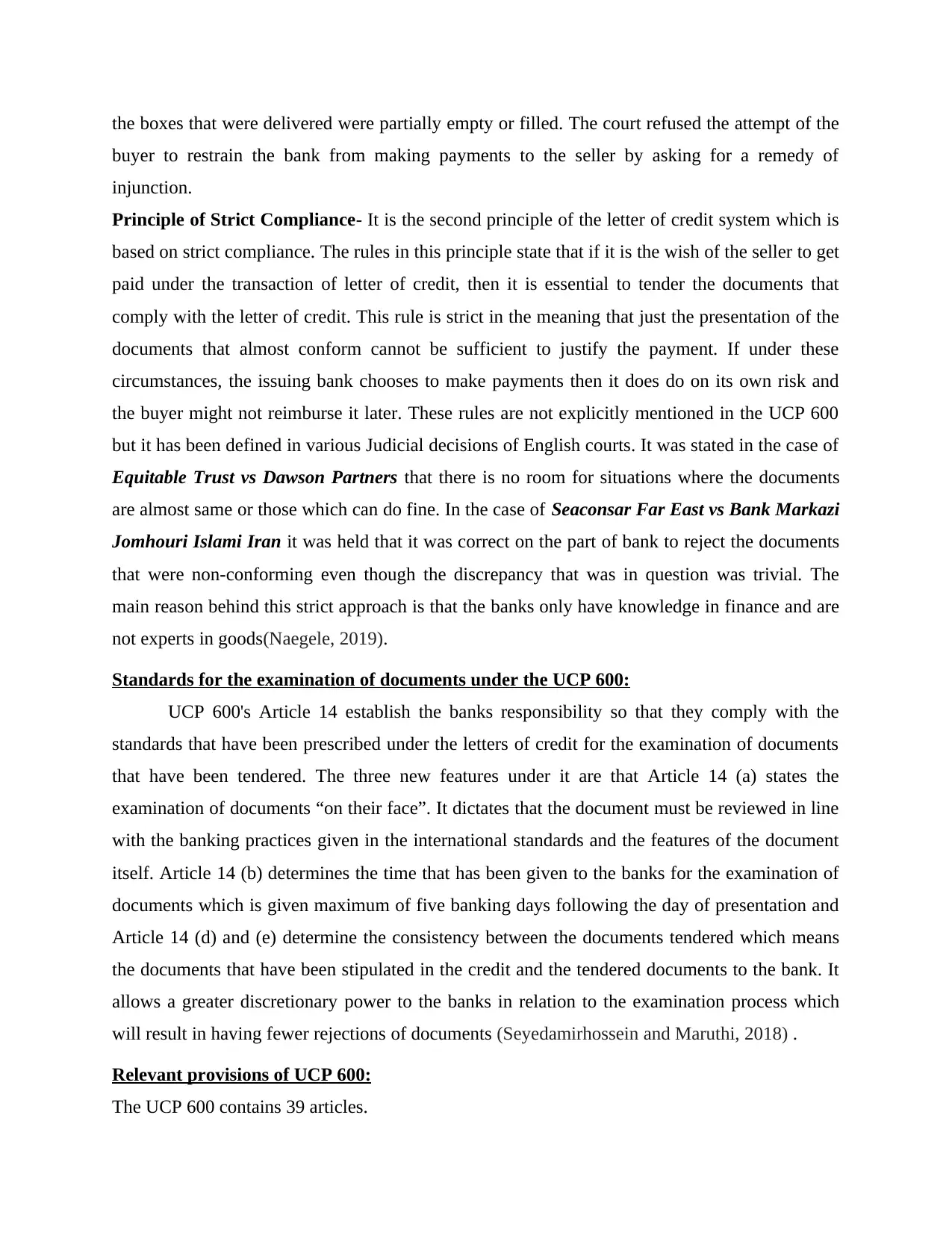
the boxes that were delivered were partially empty or filled. The court refused the attempt of the
buyer to restrain the bank from making payments to the seller by asking for a remedy of
injunction.
Principle of Strict Compliance- It is the second principle of the letter of credit system which is
based on strict compliance. The rules in this principle state that if it is the wish of the seller to get
paid under the transaction of letter of credit, then it is essential to tender the documents that
comply with the letter of credit. This rule is strict in the meaning that just the presentation of the
documents that almost conform cannot be sufficient to justify the payment. If under these
circumstances, the issuing bank chooses to make payments then it does do on its own risk and
the buyer might not reimburse it later. These rules are not explicitly mentioned in the UCP 600
but it has been defined in various Judicial decisions of English courts. It was stated in the case of
Equitable Trust vs Dawson Partners that there is no room for situations where the documents
are almost same or those which can do fine. In the case of Seaconsar Far East vs Bank Markazi
Jomhouri Islami Iran it was held that it was correct on the part of bank to reject the documents
that were non-conforming even though the discrepancy that was in question was trivial. The
main reason behind this strict approach is that the banks only have knowledge in finance and are
not experts in goods(Naegele, 2019).
Standards for the examination of documents under the UCP 600:
UCP 600's Article 14 establish the banks responsibility so that they comply with the
standards that have been prescribed under the letters of credit for the examination of documents
that have been tendered. The three new features under it are that Article 14 (a) states the
examination of documents “on their face”. It dictates that the document must be reviewed in line
with the banking practices given in the international standards and the features of the document
itself. Article 14 (b) determines the time that has been given to the banks for the examination of
documents which is given maximum of five banking days following the day of presentation and
Article 14 (d) and (e) determine the consistency between the documents tendered which means
the documents that have been stipulated in the credit and the tendered documents to the bank. It
allows a greater discretionary power to the banks in relation to the examination process which
will result in having fewer rejections of documents (Seyedamirhossein and Maruthi, 2018) .
Relevant provisions of UCP 600:
The UCP 600 contains 39 articles.
buyer to restrain the bank from making payments to the seller by asking for a remedy of
injunction.
Principle of Strict Compliance- It is the second principle of the letter of credit system which is
based on strict compliance. The rules in this principle state that if it is the wish of the seller to get
paid under the transaction of letter of credit, then it is essential to tender the documents that
comply with the letter of credit. This rule is strict in the meaning that just the presentation of the
documents that almost conform cannot be sufficient to justify the payment. If under these
circumstances, the issuing bank chooses to make payments then it does do on its own risk and
the buyer might not reimburse it later. These rules are not explicitly mentioned in the UCP 600
but it has been defined in various Judicial decisions of English courts. It was stated in the case of
Equitable Trust vs Dawson Partners that there is no room for situations where the documents
are almost same or those which can do fine. In the case of Seaconsar Far East vs Bank Markazi
Jomhouri Islami Iran it was held that it was correct on the part of bank to reject the documents
that were non-conforming even though the discrepancy that was in question was trivial. The
main reason behind this strict approach is that the banks only have knowledge in finance and are
not experts in goods(Naegele, 2019).
Standards for the examination of documents under the UCP 600:
UCP 600's Article 14 establish the banks responsibility so that they comply with the
standards that have been prescribed under the letters of credit for the examination of documents
that have been tendered. The three new features under it are that Article 14 (a) states the
examination of documents “on their face”. It dictates that the document must be reviewed in line
with the banking practices given in the international standards and the features of the document
itself. Article 14 (b) determines the time that has been given to the banks for the examination of
documents which is given maximum of five banking days following the day of presentation and
Article 14 (d) and (e) determine the consistency between the documents tendered which means
the documents that have been stipulated in the credit and the tendered documents to the bank. It
allows a greater discretionary power to the banks in relation to the examination process which
will result in having fewer rejections of documents (Seyedamirhossein and Maruthi, 2018) .
Relevant provisions of UCP 600:
The UCP 600 contains 39 articles.
⊘ This is a preview!⊘
Do you want full access?
Subscribe today to unlock all pages.

Trusted by 1+ million students worldwide
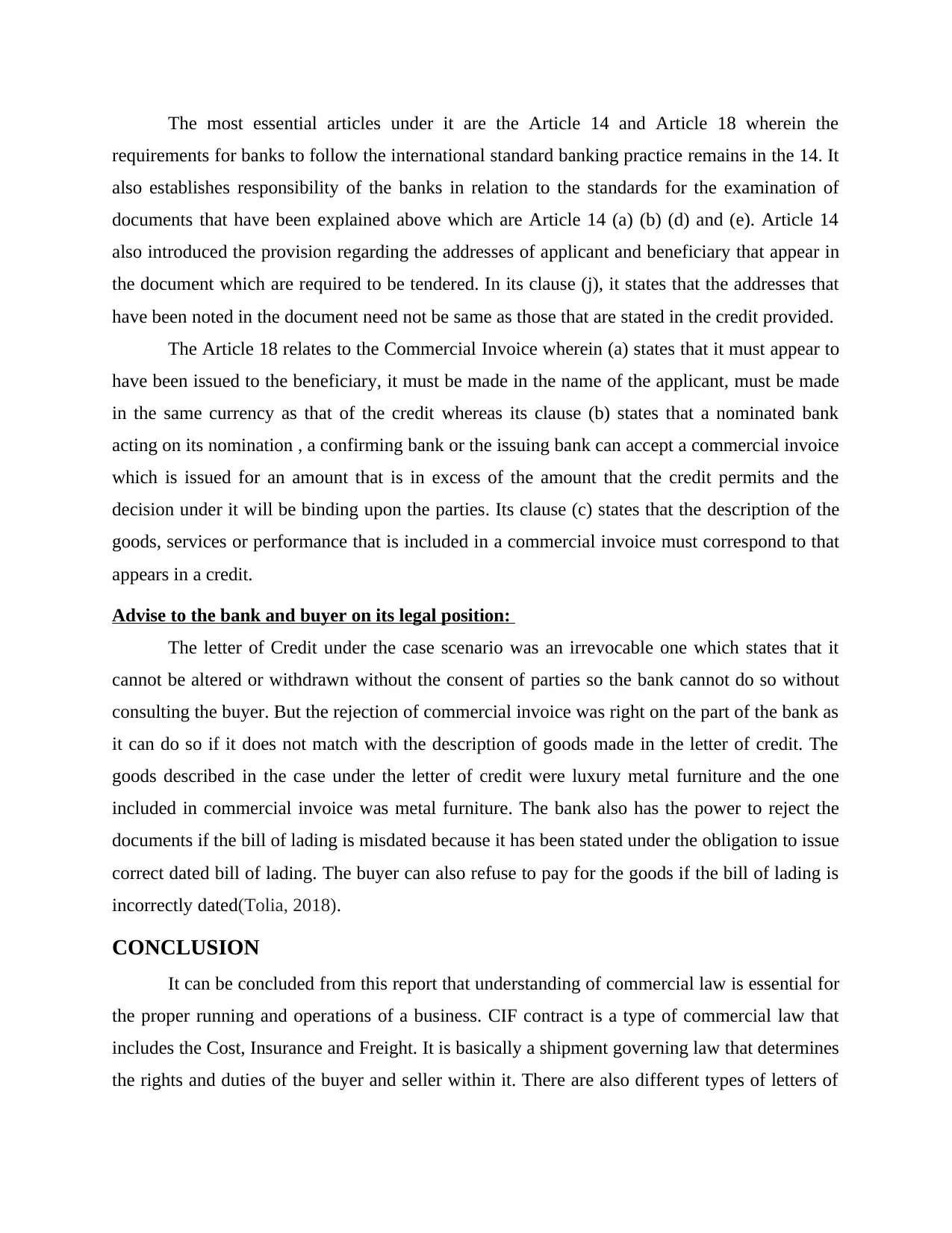
The most essential articles under it are the Article 14 and Article 18 wherein the
requirements for banks to follow the international standard banking practice remains in the 14. It
also establishes responsibility of the banks in relation to the standards for the examination of
documents that have been explained above which are Article 14 (a) (b) (d) and (e). Article 14
also introduced the provision regarding the addresses of applicant and beneficiary that appear in
the document which are required to be tendered. In its clause (j), it states that the addresses that
have been noted in the document need not be same as those that are stated in the credit provided.
The Article 18 relates to the Commercial Invoice wherein (a) states that it must appear to
have been issued to the beneficiary, it must be made in the name of the applicant, must be made
in the same currency as that of the credit whereas its clause (b) states that a nominated bank
acting on its nomination , a confirming bank or the issuing bank can accept a commercial invoice
which is issued for an amount that is in excess of the amount that the credit permits and the
decision under it will be binding upon the parties. Its clause (c) states that the description of the
goods, services or performance that is included in a commercial invoice must correspond to that
appears in a credit.
Advise to the bank and buyer on its legal position:
The letter of Credit under the case scenario was an irrevocable one which states that it
cannot be altered or withdrawn without the consent of parties so the bank cannot do so without
consulting the buyer. But the rejection of commercial invoice was right on the part of the bank as
it can do so if it does not match with the description of goods made in the letter of credit. The
goods described in the case under the letter of credit were luxury metal furniture and the one
included in commercial invoice was metal furniture. The bank also has the power to reject the
documents if the bill of lading is misdated because it has been stated under the obligation to issue
correct dated bill of lading. The buyer can also refuse to pay for the goods if the bill of lading is
incorrectly dated(Tolia, 2018).
CONCLUSION
It can be concluded from this report that understanding of commercial law is essential for
the proper running and operations of a business. CIF contract is a type of commercial law that
includes the Cost, Insurance and Freight. It is basically a shipment governing law that determines
the rights and duties of the buyer and seller within it. There are also different types of letters of
requirements for banks to follow the international standard banking practice remains in the 14. It
also establishes responsibility of the banks in relation to the standards for the examination of
documents that have been explained above which are Article 14 (a) (b) (d) and (e). Article 14
also introduced the provision regarding the addresses of applicant and beneficiary that appear in
the document which are required to be tendered. In its clause (j), it states that the addresses that
have been noted in the document need not be same as those that are stated in the credit provided.
The Article 18 relates to the Commercial Invoice wherein (a) states that it must appear to
have been issued to the beneficiary, it must be made in the name of the applicant, must be made
in the same currency as that of the credit whereas its clause (b) states that a nominated bank
acting on its nomination , a confirming bank or the issuing bank can accept a commercial invoice
which is issued for an amount that is in excess of the amount that the credit permits and the
decision under it will be binding upon the parties. Its clause (c) states that the description of the
goods, services or performance that is included in a commercial invoice must correspond to that
appears in a credit.
Advise to the bank and buyer on its legal position:
The letter of Credit under the case scenario was an irrevocable one which states that it
cannot be altered or withdrawn without the consent of parties so the bank cannot do so without
consulting the buyer. But the rejection of commercial invoice was right on the part of the bank as
it can do so if it does not match with the description of goods made in the letter of credit. The
goods described in the case under the letter of credit were luxury metal furniture and the one
included in commercial invoice was metal furniture. The bank also has the power to reject the
documents if the bill of lading is misdated because it has been stated under the obligation to issue
correct dated bill of lading. The buyer can also refuse to pay for the goods if the bill of lading is
incorrectly dated(Tolia, 2018).
CONCLUSION
It can be concluded from this report that understanding of commercial law is essential for
the proper running and operations of a business. CIF contract is a type of commercial law that
includes the Cost, Insurance and Freight. It is basically a shipment governing law that determines
the rights and duties of the buyer and seller within it. There are also different types of letters of
Paraphrase This Document
Need a fresh take? Get an instant paraphrase of this document with our AI Paraphraser

credit among which the most famous ones are the documentary and standby letters of credit and
the revocable and irrevocable letters of credit. The main characteristics of letters of Credit are the
Principles of Autonomy and the principle of strict compliance. UCP 600 defines the provisions
with respect to the standards of documents in the sale of goods.
the revocable and irrevocable letters of credit. The main characteristics of letters of Credit are the
Principles of Autonomy and the principle of strict compliance. UCP 600 defines the provisions
with respect to the standards of documents in the sale of goods.
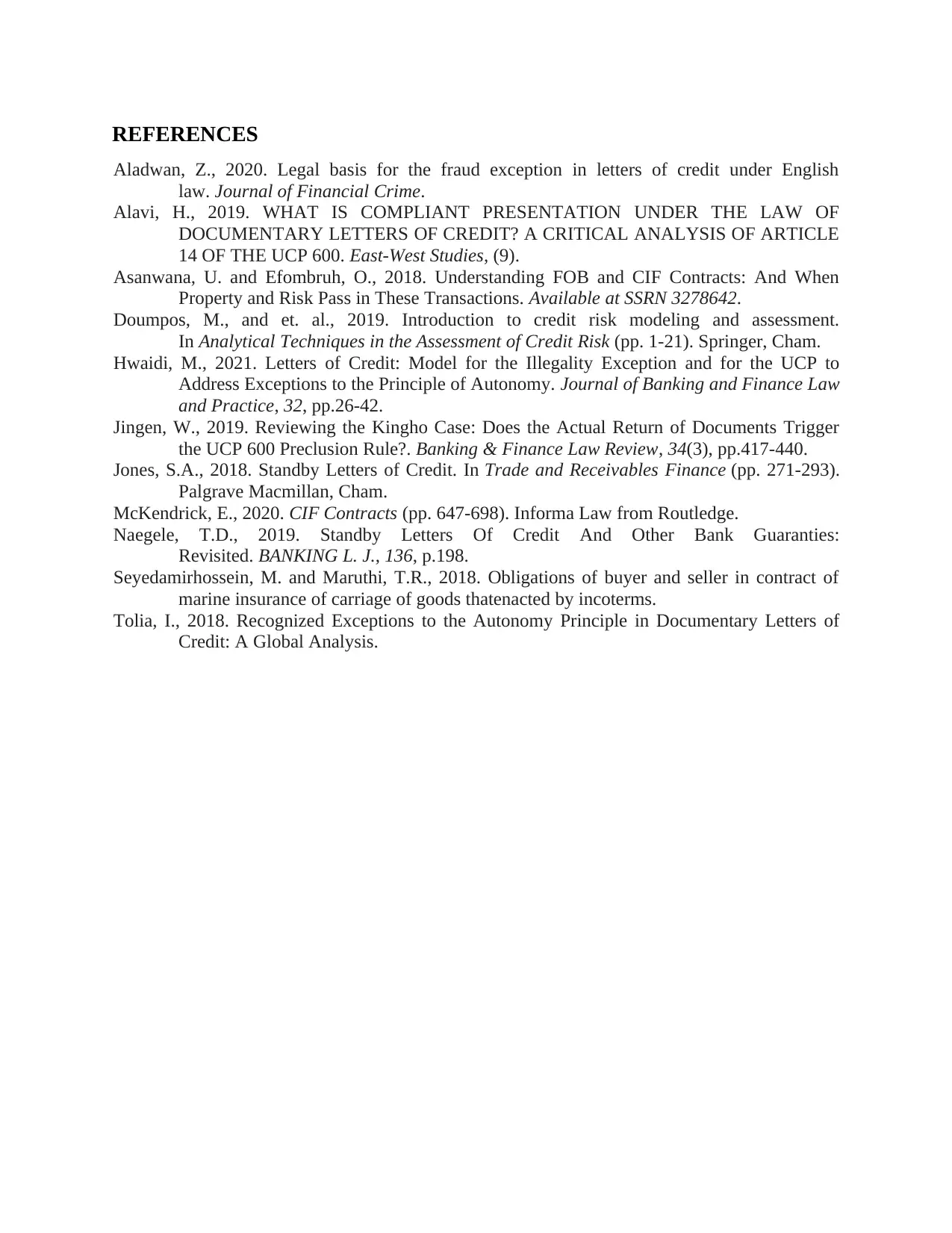
REFERENCES
Aladwan, Z., 2020. Legal basis for the fraud exception in letters of credit under English
law. Journal of Financial Crime.
Alavi, H., 2019. WHAT IS COMPLIANT PRESENTATION UNDER THE LAW OF
DOCUMENTARY LETTERS OF CREDIT? A CRITICAL ANALYSIS OF ARTICLE
14 OF THE UCP 600. East-West Studies, (9).
Asanwana, U. and Efombruh, O., 2018. Understanding FOB and CIF Contracts: And When
Property and Risk Pass in These Transactions. Available at SSRN 3278642.
Doumpos, M., and et. al., 2019. Introduction to credit risk modeling and assessment.
In Analytical Techniques in the Assessment of Credit Risk (pp. 1-21). Springer, Cham.
Hwaidi, M., 2021. Letters of Credit: Model for the Illegality Exception and for the UCP to
Address Exceptions to the Principle of Autonomy. Journal of Banking and Finance Law
and Practice, 32, pp.26-42.
Jingen, W., 2019. Reviewing the Kingho Case: Does the Actual Return of Documents Trigger
the UCP 600 Preclusion Rule?. Banking & Finance Law Review, 34(3), pp.417-440.
Jones, S.A., 2018. Standby Letters of Credit. In Trade and Receivables Finance (pp. 271-293).
Palgrave Macmillan, Cham.
McKendrick, E., 2020. CIF Contracts (pp. 647-698). Informa Law from Routledge.
Naegele, T.D., 2019. Standby Letters Of Credit And Other Bank Guaranties:
Revisited. BANKING L. J., 136, p.198.
Seyedamirhossein, M. and Maruthi, T.R., 2018. Obligations of buyer and seller in contract of
marine insurance of carriage of goods thatenacted by incoterms.
Tolia, I., 2018. Recognized Exceptions to the Autonomy Principle in Documentary Letters of
Credit: A Global Analysis.
Aladwan, Z., 2020. Legal basis for the fraud exception in letters of credit under English
law. Journal of Financial Crime.
Alavi, H., 2019. WHAT IS COMPLIANT PRESENTATION UNDER THE LAW OF
DOCUMENTARY LETTERS OF CREDIT? A CRITICAL ANALYSIS OF ARTICLE
14 OF THE UCP 600. East-West Studies, (9).
Asanwana, U. and Efombruh, O., 2018. Understanding FOB and CIF Contracts: And When
Property and Risk Pass in These Transactions. Available at SSRN 3278642.
Doumpos, M., and et. al., 2019. Introduction to credit risk modeling and assessment.
In Analytical Techniques in the Assessment of Credit Risk (pp. 1-21). Springer, Cham.
Hwaidi, M., 2021. Letters of Credit: Model for the Illegality Exception and for the UCP to
Address Exceptions to the Principle of Autonomy. Journal of Banking and Finance Law
and Practice, 32, pp.26-42.
Jingen, W., 2019. Reviewing the Kingho Case: Does the Actual Return of Documents Trigger
the UCP 600 Preclusion Rule?. Banking & Finance Law Review, 34(3), pp.417-440.
Jones, S.A., 2018. Standby Letters of Credit. In Trade and Receivables Finance (pp. 271-293).
Palgrave Macmillan, Cham.
McKendrick, E., 2020. CIF Contracts (pp. 647-698). Informa Law from Routledge.
Naegele, T.D., 2019. Standby Letters Of Credit And Other Bank Guaranties:
Revisited. BANKING L. J., 136, p.198.
Seyedamirhossein, M. and Maruthi, T.R., 2018. Obligations of buyer and seller in contract of
marine insurance of carriage of goods thatenacted by incoterms.
Tolia, I., 2018. Recognized Exceptions to the Autonomy Principle in Documentary Letters of
Credit: A Global Analysis.
⊘ This is a preview!⊘
Do you want full access?
Subscribe today to unlock all pages.

Trusted by 1+ million students worldwide
1 out of 9
Related Documents
Your All-in-One AI-Powered Toolkit for Academic Success.
+13062052269
info@desklib.com
Available 24*7 on WhatsApp / Email
![[object Object]](/_next/static/media/star-bottom.7253800d.svg)
Unlock your academic potential
Copyright © 2020–2026 A2Z Services. All Rights Reserved. Developed and managed by ZUCOL.





